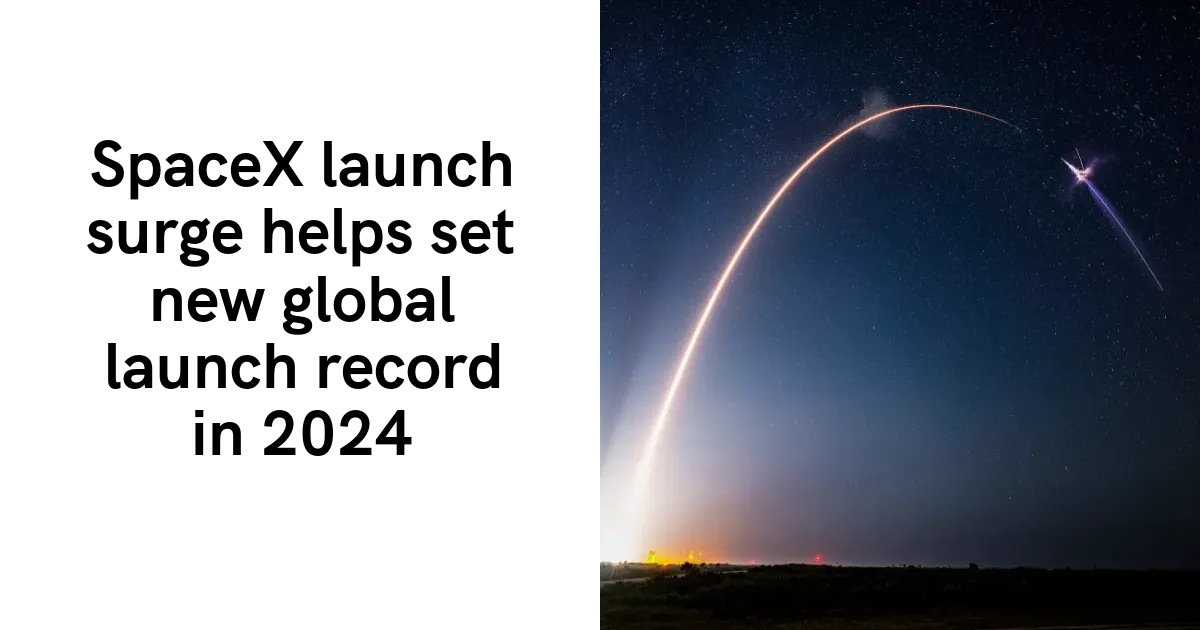Record-Breaking Year for Orbital Launches in 2024 Driven by SpaceX
In a remarkable display of technological advancement and ambition, the global aerospace industry has reached new heights with a record-setting number of orbital launches in 2024. This surge was primarily fueled by the relentless efforts of SpaceX, the company at the forefront of revolutionizing space travel.
According to data compiled from open source records by SpaceNews, the year saw a total of 259 orbital launch attempts, marking a significant 17% increase from the previous record of 221 launches in 2023. It should be noted that these statistics do not take into account suborbital flights, such as the four SpaceX Starship/Super Heavy test flights or the two launches of the HASTE suborbital variant of Rocket Lab’s Electron rocket.
SpaceX: Leading the Charge
SpaceX’s role in this historic achievement is indeed noteworthy. The company conducted an impressive 134 launches of its Falcon 9 and Falcon Heavy rockets in 2024, compared to 96 launches in 2023. This means that SpaceX alone accounted for more than half of the global orbital launch attempts, outpacing every other entity around the world combined.
The company dominated the launch activities in the United States, executing 88 out of 93 launches from Florida’s Eastern Range, which encompasses Cape Canaveral Space Force Station and Kennedy Space Center. Likewise, SpaceX was responsible for 46 of the 47 launches from California’s Western Range at Vandenberg Space Force Base. Other U.S. companies conducted just 20 orbital launches, including 13 Electron rocket launches from Rocket Lab’s Launch Complex 1 in New Zealand.
Global Launch Landscape
Beyond SpaceX, other nations also contributed to the heightened launch activity. China maintained its strong presence in the aerospace sector with 68 launches, surpassing its previous record of 67 in 2023. Russia followed with 17 launches, while Japan conducted seven, India five, Iran four, and Europe three. North Korea also made a single launch attempt.
Despite the successes, the year was not without its setbacks. There were six launch failures out of the 259 attempts. Among these, the Japanese venture Space One’s Kairos vehicle failed in its initial two launches in March and December. Additionally, two Chinese commercial rockets, Hyperbola-1 and Lijian-1, encountered failures in July and December, respectively. North Korea’s sole launch attempt also resulted in failure. Furthermore, a SpaceX Falcon 9 mission aiming to deploy Starlink satellites experienced an upper stage malfunction during an engine relight, which meant the satellites ended up in unsustainable low orbits.
SpaceX’s Ambitious Goals
In 2024, SpaceX had aimed to achieve 148 Falcon rocket launches, including four postponed from 2023 when they narrowly missed their target of 100 launches. However, by the end of the year, the company had adjusted its goal to 136 launches, as announced by Gwynne Shotwell, SpaceX’s president and COO, during a December event at the Center for Strategic and International Studies (CSIS).
Looking ahead, Shotwell revealed plans for an even more ambitious schedule in 2025, with projections of completing between 175 and 180 Falcon launches. This increased launch cadence is part of SpaceX’s strategy to maintain its competitive edge and combat complacency. "We just keep pushing the limits," Shotwell emphasized. "That’s how you stay in fighting weight."
Moreover, SpaceX is preparing to escalate the number of Starship launches, including the inaugural truly orbital missions slated for 2025. The company anticipates that Starship will ultimately enable a launch rate far exceeding that of the Falcon series. As highlighted by SpaceX founder Elon Musk’s vision, the long-term goal is to achieve an astounding 1,000 Starship launches annually.
The Implications of Increased Launch Activity
The surge in launch activity has multiple implications for the aerospace industry and beyond. Firstly, the increased number of launches signifies a growing demand for satellite deployments, driven by the need for enhanced global connectivity, earth observation, and scientific research. Companies like SpaceX are pivotal in meeting this demand, leveraging their reusable rocket technology to offer more cost-effective and reliable access to space.
Furthermore, the heightened launch frequency is driving innovation and competition within the industry. As companies strive to enhance their capabilities and reduce costs, the benefits extend to a wider range of sectors, including telecommunications, environmental monitoring, and national security.
However, this rapid increase in orbital launches also raises concerns about space traffic management and environmental impacts. The sheer volume of launches necessitates careful coordination to prevent collisions and manage space debris. Additionally, the increased frequency of rocket launches prompts discussions about their environmental footprint, including emissions and their potential effects on the atmosphere.
Conclusion
The year 2024 has marked a milestone in the history of space exploration, with a record number of orbital launches, largely propelled by SpaceX’s pioneering efforts. As the company sets its sights on even more ambitious targets for 2025 and beyond, the aerospace industry is poised for continued growth and innovation. However, with this progress comes the responsibility to address the challenges of managing space traffic and minimizing environmental impacts, ensuring that the benefits of space exploration are realized sustainably.
For more information, refer to the original analysis on SpaceNews.
For more Information, Refer to this article.

































